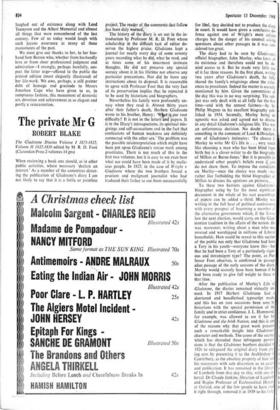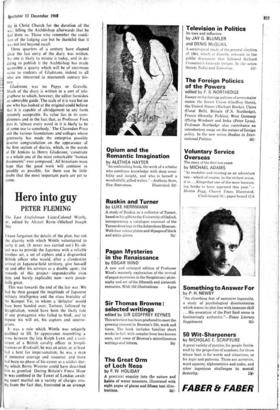The private Mr G
ROBERT BLAKE
When reviewing a book one should, as in other public activities, where necessary 'declare an interest.' As a member of the committee direct- ing the publication of Gladstone's diary I am not likely to say that it is a futile or pointless project. The reacler of the comments, that follow „has been duly warned. -
The history of the diary is set out in the in- troduction by Professor M. R. D. Foot whose icholarship in the difficult task of editor de- serves the highest praise. Gladstone kept a journal for nearly every day of some seventy years recording what he did, what he read, and at times some of his innermost intimate thoughts. He did not preserve any special secrecy about it in his lifetime nor observe any particular precautions. Nor did he leave any instructions about its disposal. It is reasonable to agree with Professor Foot that the very fact of its preservation implies that he expected it to be used by historians and biographers.
Nevertheless his family were profoundly un- easy when they read it. Almost thirty years after their father's death, Herbert Gladstone wrote to his brother, Henry: ToVtliour root difficulty? It is not in the letteriUd papers. It is in the Diary's introspections, its spiritual mis- givings and self-accusations and in the fact that confessions of human weakness are definitely connected with the other sex.' The problem, was the possible misinterpretation which might have been put upon Gladstone's rescue work among prostitutes. Therb is not much of this in the first two volumes, but it is easy to see even here what use could have been made of it by malic- ious people. In 1927, in the case of Wright v Gladstone where the two brothers forced a prurient and malignant journalist who had traduced their father to sue them unsuccessfully
for libel, they decided not to produce the diary in court. It would have given a conclusive fence against one of Wright's most ,odious charges but the danger of his counsel asking questions about other passages in it was con- .sidered too great.
The diary had to be seen by Gladstone's official biographer, John Morley, who knew of its 'existence and therefore could not be de- nied access to it. But he made very little use of it for three reasons. In the first place, writing two years after Gladstone's death, he fully shared the family's misgivings about the refer- ences to prostitutes. Indeed the matter is scarcely mentioned by him. Given the conventions of the day this was in no way surprising. The sub- ject was only dealt with at all fully for the first time—and with the utmost fairness—by Sir Philip Magnus in his excellent biography pub- lished in 1954. Secondly, Morley being an agnostic was asked and agreed not to discuss in any detail Gladstone's religious life. This was an • .unfortunate decision. No doubt there is something in the comment of Lord Kilbracken, one of Gladstone's intimates: 'To choose J. Morley to write Mr G's life is . . . very much like choosing a man who has been blind frpm birth but is a clever.writer to do the biography of Millais or Burne-Jones.' But it is possib1e, to ,nnderstand other people's beliefs even if, you do not share them. To impose the conditions on Morley—once the choice was made---as rather like forbidding the blind biograp4er, of Millais to discuss his opinions on pictures, To these two barriers against Gladstone's biographer using by far the most significant document in the whole of his vast assemblage of papers can be added a --third: 'Morley was writing in the full heat of political controversy with every prospect of becoming a member of the alternative government which, if the Tories lost the next election, would carry on the Glad- stonian tradition in the affairs of the nation. 1,1e was, moreover, writing about a man who was revered and worshipped in millions of Liberal households. How could he reveal to this section of the public not only that Gladstone had been a Tory in his youth—everyone knew this—but that he had been a Tory of a particularly vigor- ous and intransigent type? The point, as Pro- fessor Foot obseives, is confirmed in passage _afiter.,passage of the early sections of the diary. Morley would scarcely have been human if he had been ready to give full weight to these at that time.
After the publication of Morley's Life of Gladstone, the diaries remained virtually un- -used. In 1917 Herbert Gladstone had a shortened and bowdlerised typescript made, and this has on rare occasions been seen by historians with the special permission of the family and in strict confidence. J. L. Hammond. for example, was allowed to see it for his Gladstone and the Irish Nation, and this is one of the reasons why that great work presents such a remarkable insight into Gladstone.
character and methods. The cause of the secrecy which has shrouded these infrequent permis- sions is that the Gladstone brothers decided i 1926 to- safeguard the original diary from PI?
ing eyes by presenting it to the Archbishop 0 Canterbury, as the absolute property of him and his successors with sole discretion as to, acces5 and publication. It has remained in the library of Lambeth from that day to this, with pne in- terval. Dr Claude Jenkins, librarian of Lanabeth and Regius Professor of Ecclesiastical 1-listo at Oxford, one of the few people to have rea it right through, removed it in 1939 to his lodg
igg in Christ Church for -the duration of, the. war, telling the Archbishop afterwards, that he tiad done so. Those who remember the condi- tion of the lodging can but be thankful that it was not lost beyond recall.
Three quarters of a century have elapsed since the last entry of the diary was written. No one is likely to misuse it today, and in de- ciding to publish it the Archbishop has made accessible a quarry which will be of enormous value to students of Gladstone, indeed to all who are interested in nineteenth century his- tory. -
Gladstone was no Pepys or Greville. Much of the diary is written in a sort of tele- graphese to which, however, the editor furnishes an admirable guide. The scale of it is vast but no one who has. looked at the original could believe that it is capable of abridgement in any form remotely acceptable. Its value lies in its com- pleteness and in -the fact that, as Professor Foot. puts it, 'almost every word in it is likely to be. of some use to somebody.' The Clarendon Press and the various foundations and 'colleges whose generosity has made the enterprise possible deserve congratulation on the appearance of the first section of diaries, which, in the words of Dr Jenkins to Henry Gladstone, 'constitute as a whole one of the most remarkable "human documents" ever composed.' All historians must hope that the good work will continue as speedily as possible, for there can be little doubt that the most important parts are yet to come.















































 Previous page
Previous page